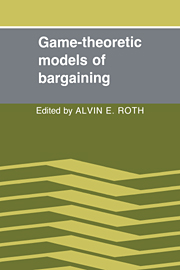Book contents
- Frontmatter
- Contents
- List of contributors
- Preface
- Chapter 1 Editor's introduction and overview
- Chapter 2 Disagreement in bargaining: Models with incomplete information
- Chapter 3 Reputations in games and markets
- Chapter 4 An approach to some noncooperative game situations with special attention to bargaining
- Chapter 5 Infinite-horizon models of bargaining with one-sided incomplete information
- Chapter 6 Choice of conjectures in a bargaining game with incomplete information
- Chapter 7 Analysis of two bargaining problems with incomplete information
- Chapter 8 Sequential bargaining mechanisms
- Chapter 9 The role of risk aversion in a simple bargaining model
- Chapter 10 Risk sensitivity and related properties for bargaining solutions
- Chapter 11 Axiomatic theory of bargaining with a variable population: A survey of recent results
- Chapter 12 Toward a focal-point theory of bargaining
- Chapter 13 Bargaining and coalitions
- Chapter 14 Axiomatic approaches to coalitional bargaining
- Chapter 15 A comment on the Coase theorem
- Chapter 16 Disclosure of evidence and resolution of disputes: Who should bear the burden of proof?
- Chapter 17 The role of arbitration and the theory of incentives
Chapter 12 - Toward a focal-point theory of bargaining
Published online by Cambridge University Press: 23 September 2009
- Frontmatter
- Contents
- List of contributors
- Preface
- Chapter 1 Editor's introduction and overview
- Chapter 2 Disagreement in bargaining: Models with incomplete information
- Chapter 3 Reputations in games and markets
- Chapter 4 An approach to some noncooperative game situations with special attention to bargaining
- Chapter 5 Infinite-horizon models of bargaining with one-sided incomplete information
- Chapter 6 Choice of conjectures in a bargaining game with incomplete information
- Chapter 7 Analysis of two bargaining problems with incomplete information
- Chapter 8 Sequential bargaining mechanisms
- Chapter 9 The role of risk aversion in a simple bargaining model
- Chapter 10 Risk sensitivity and related properties for bargaining solutions
- Chapter 11 Axiomatic theory of bargaining with a variable population: A survey of recent results
- Chapter 12 Toward a focal-point theory of bargaining
- Chapter 13 Bargaining and coalitions
- Chapter 14 Axiomatic approaches to coalitional bargaining
- Chapter 15 A comment on the Coase theorem
- Chapter 16 Disclosure of evidence and resolution of disputes: Who should bear the burden of proof?
- Chapter 17 The role of arbitration and the theory of incentives
Summary
Introduction
The purpose of this chapter is to consider some recent experimental evidence that existing models of bargaining, both axiomatic and strategic, are incomplete in ways that make them unlikely candidates from which to build powerful descriptive models of bargaining. After reviewing some of this evidence, a direction will be proposed that seems to offer some promising possibilities, and this will be briefly explored with the aid of an extremely simple preliminary model.
The plan of the chapter is as follows. Section 12.2 reviews some experiments in which certain kinds of information that are assumed by existing game-theoretic models not to influence the outcome of bargaining were nevertheless observed to have a dramatic effect. The data from these experiments make it plausible to suggest that bargainers sought to identify initial bargaining positions that had some special reason for being credible, and that these credible bargaining positions then served as focal points that influenced the subsequent conduct of negotiations, and their outcome. Section 12.3 explores this idea by investigating a simple model of coordination between two well-defined focal points. This model exhibits some of the same qualitative features observed in the bargaining data, concerning the frequency of disagreements as a function of the focal points. The section concludes with a brief discussion.
Review of four experiments
To test theories that depend on the expected utilities of the players, it is desirable to design experiments that allow the participants' utility functions to be determined.
- Type
- Chapter
- Information
- Game-Theoretic Models of Bargaining , pp. 259 - 268Publisher: Cambridge University PressPrint publication year: 1985
- 28
- Cited by



